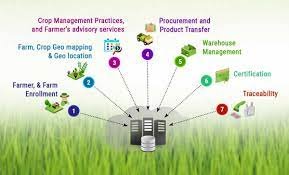
Introduction:
In the vast landscape of agriculture, the journey of commodities from farm to fork is an intricate dance orchestrated by various players in the supply chain. At the heart of this intricate web lies the supply chain supervisor, a pivotal role responsible for ensuring seamless operations, efficiency, and sustainability throughout the entire process. In this article, we delve into the world of agri-commodities and explore the indispensable role of a supply chain supervisor in this dynamic industry.
Understanding the Agri-Commodities Supply Chain:
The agri-commodities supply chain is a complex network involving multiple stages, from cultivation to consumption. It encompasses various activities such as farming, harvesting, processing, storage, transportation, and distribution. Each stage presents its unique challenges, ranging from weather uncertainties and crop diseases to market volatility and regulatory compliance.
Key Responsibilities of a Supply Chain Supervisor:
A supply chain supervisor in agri-commodities plays a multifaceted role, encompassing a wide range of responsibilities to ensure the smooth flow of goods and information across the supply chain. Some of the key responsibilities include:
- Planning and Coordination:
- Developing strategic plans for procurement, production, and distribution.
- Coordinating activities between different stakeholders, including farmers, suppliers, manufacturers, distributors, and retailers.
- Optimizing inventory levels to meet demand while minimizing carrying costs and stockouts.
- Quality Control and Compliance:
- Implementing quality control measures to maintain product standards and safety regulations.
- Ensuring compliance with industry standards, certifications, and government regulations, such as organic certification and food safety protocols.
- Monitoring and addressing any issues related to product quality, contamination, or adulteration.
- Supply Chain Visibility and Transparency:
- Implementing systems and technologies for real-time tracking and monitoring of inventory, shipments, and logistics.
- Enhancing transparency across the supply chain through data sharing and collaboration platforms.
- Proactively identifying bottlenecks, inefficiencies, and risks to mitigate disruptions and improve responsiveness.
- Risk Management and Contingency Planning:
- Assessing and mitigating risks associated with factors such as market fluctuations, geopolitical events, natural disasters, and supply chain disruptions.
- Developing contingency plans and alternative sourcing strategies to ensure continuity of supply in unforeseen circumstances.
- Collaborating with stakeholders to enhance resilience and agility in the supply chain.
- Sustainability and Ethical Sourcing:
- Promoting sustainability practices throughout the supply chain, including environmentally friendly farming methods, responsible sourcing, and waste reduction initiatives.
- Collaborating with suppliers to ensure fair labor practices, ethical sourcing, and social responsibility.
- Implementing initiatives to reduce carbon footprint, conserve resources, and promote sustainable agriculture practices.
Challenges Faced by Supply Chain Supervisors in Agri-Commodities:
Supply chain supervisors in the agri-commodities sector encounter a myriad of challenges that require adept navigation and innovative solutions. Some of the key challenges include:
- Seasonal Variability and Weather Risks:
- Fluctuations in weather patterns can significantly impact crop yields, harvest timings, and transportation logistics, leading to supply chain disruptions and price volatility.
- Market Volatility and Price Fluctuations:
- Agri-commodities are subject to price fluctuations influenced by factors such as global demand-supply dynamics, currency fluctuations, geopolitical tensions, and trade policies.
- Infrastructural Constraints:
- Inadequate infrastructure, including transportation networks, storage facilities, and cold chain logistics, can pose challenges in maintaining product quality, reducing wastage, and meeting delivery deadlines.
- Regulatory Compliance and Food Safety:
- Stringent regulations pertaining to food safety, quality standards, and traceability require meticulous adherence to ensure compliance and mitigate risks of recalls or sanctions.
- Sustainability and Environmental Concerns:
- Increasing consumer demand for sustainably sourced and ethically produced commodities necessitates proactive efforts to address environmental challenges, such as soil degradation, water scarcity, and deforestation.

Strategies for Success:
To overcome these challenges and excel in their role, supply chain supervisors in agri-commodities can adopt several strategies:
- Embrace Digital Transformation:
- Leverage advanced technologies such as blockchain, IoT (Internet of Things), AI (Artificial Intelligence), and data analytics to enhance visibility, transparency, and efficiency across the supply chain.
- Foster Collaboration and Partnerships:
- Forge strategic partnerships with suppliers, manufacturers, logistics providers, and other stakeholders to streamline operations, share best practices, and drive innovation.
- Invest in Talent Development:
- Cultivate a skilled workforce equipped with domain expertise, technological proficiency, and problem-solving capabilities to navigate complexities and drive continuous improvement.
- Prioritize Sustainability and Resilience:
- Integrate sustainability principles into supply chain strategies, from sourcing to distribution, to mitigate risks, enhance brand reputation, and create long-term value.
- Adaptability and Agility:
- Foster a culture of adaptability and agility to respond swiftly to changing market dynamics, disruptions, and customer preferences, ensuring resilience and competitive advantage.
Conclusion:
In the dynamic world of agri-commodities, the role of a supply chain supervisor is indispensable in ensuring the efficient flow of goods from farm to table. By embracing innovation, collaboration, and sustainability, supply chain supervisors can overcome challenges, drive operational excellence, and create value across the entire supply chain. As the agricultural landscape continues to evolve, the role of supply chain supervisors will remain pivotal in shaping the future of agri-commodities supply chains.
